'Address Election Complaints', Iran's Quds Commander Tells Iraqis
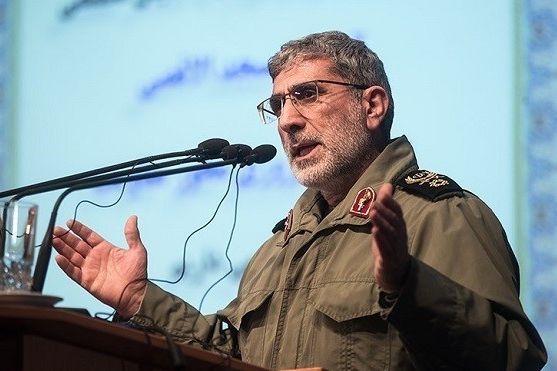
The commander of IRGC Quds Force has told Iraqi leaders that Iran would support the final results of Iraq’s elections, but all complaints should be addressed.

The commander of IRGC Quds Force has told Iraqi leaders that Iran would support the final results of Iraq’s elections, but all complaints should be addressed.
General Esmail Ghaani visited Iraq immediately after a drone attack on Prime Minister Mustafa al-Kadhimi’s residence on Sunday and met with several senior officials and Shiite militia commanders to contain a possible crisis in relations.
The drone attack that did not harm al-Kadhimi is believed to have been launched by Iran-backed militias whose political blocs lost in recent parliamentary elections and are contesting the results. They have been holding protests to change the election outcome.
Iran’s ambassador to Baghdad, Iraj Masjedi told Al Alam television that Ghaani reaffirmed Iran’s support for the election results but demanded that complaints and protests to be dealt with according to the law.
Iran has been building a network of political and military support within Iraq since the overthrow of Saddam Hussein’s regime in 2003, but since 2019, many Iraqis have been protesting Tehran’s influence, complaining that it contributes to corruption and mismanagement. Iraq witnessed large anti-government protests in 2019 and 2020.
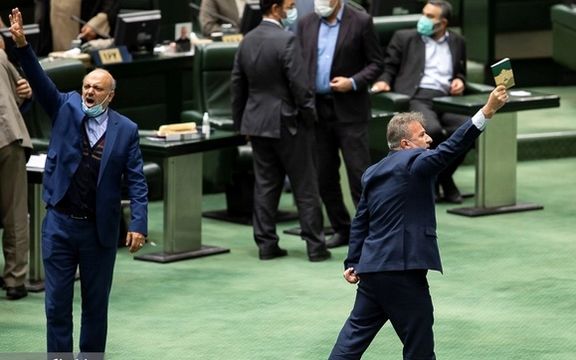
Nepotism has become such a characteristic feature of the Raisi government that even Iran's hardline parliament is protesting appointments based on kinship.
One of the latest cases of nepotism in the Raisi administration is the nomination of Massoud Fayazi, a close relative of Tehran's mayor Alireza Zakani as education minister.
Iran International TV's correspondent Mojtaba Pourmohsen has revealed Fayazi's debatable academic credentials in an investigative report which he summarized in a tweet on November 10. These include a Ph.D. degree awarded by a committee that is not linked to any official academic institution. Even his earlier diploma in the area of civil engineering is also reportedly not quite sound.
According to the Iranian Labor News Agency (ILNA) several lawmakers expressed their opposition to Fayazi's nomination when Majles Speaker Mohammad Bagher Ghalibaf announced it on Tuesday.
The Majles has already rejected Raisi's first choice for Minister of Education Hossein Baghgoli, a relative of the President's wife, in August. Members of the Cultural Committee of the Majles told reporters on Wednesday that they will try to make sure Fayazi also does not win the parliament's vote of confidence.
Earlier, Raisi's brother-in-law Ali Alamolhoda who was appointed as the chancellor of Payam Noor University resigned his post and Zakani was forced to fire his son-in-law under pressure from the press and social media a few days after he was appointed as his own deputy.
Nepotism was also a problem that led to scandals for Hassan Rouhani and Mahmoud Ahmadinejad's administrations, but the problem appears to be even more widespread under President Ebrahim Raisi.
During the past weeks, several media reports accused Health Minister Bahram Einollahi, Economy Minister Ehsan Khandouzi and Oil Minister Javad Owji of giving key posts to their own or other officials' relatives in their agencies. Raisi, pressed on several occasions including during his meeting last week with reformist journalists, was forced to say that he would look into the matter. But subsequently he ordered his cabinet ministers to refute reports about appointing their relatives if such reports are not true.
Mohammad Saleh Jokar, an MP for Yazd told Khabar Onlinethat nepotism will lead to corruption and that he did not expect such things to happen in President Raisi's government. Meanwhile, according to the news agency of the Iranian parliament, Jalil Rahimi Jahanabadi, a conservative lawmaker close to Raisi, told reporters that appointing Fayazi as the Minister of education and ignoring capable individuals as candidates for the post would be an insult to Iranian teachers and cultural figures.
Another hardline lawmaker, Esmail Kowsari, criticized President Raisifor his failure to give key posts to well-qualified individuals and acknowledged that appointments based on kinship with top officials will inevitably lead to corruption.
Reformist figure Zahra Nejadbaharam also said that "appointing officials' in-laws to key posts is a disgrace for the Raisi administration and Raisi needs to intervene in the matter. This is an undesirable practice that damages the country's prestige."
According to Khabar Online, vice president for parliamentary affairs Mohammad Hosseini called on state officials to revoke nepotism-based appointments as the government's critics are likely to use them against the Raisi administration.
This latest bout of attacks on the new president adds to criticism about Raisi’s appointments in general. Many top officials are not qualified for their posts and after one hundred days, the government has done little to improve the economy and other crises gripping the country.
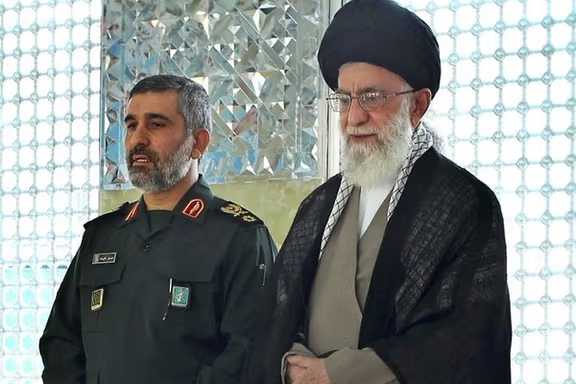
If Israel gives Iran an excuse it will hasten its own destruction, the commander of Iran’s Aerospace Force said at a memorial ceremony in Tehran on Thursday.
General Amirali Hajizadeh said that Israeli officials are well aware they can start a conflict, but Iran will be the one to bring it to its conclusion, which is “the destruction of the Zionist regime”.
Hajizadeh was speaking at a ceremony to mark the death of Hassan Tehrani Moghaddam, one of Iran’s earliest missile architects, who was killed when a huge explosion rocked a missile base 30 miles from Tehran in November 2012.
Moghaddam was among 17 top IRGC officers killed that day, in what many believed was an operation by Israeli intelligence. The incident was so shocking that even Supreme Leader Ali Khamenei attended the funeral at the time.
Hajizadeh also praised the advances in Iran’s military drone program saying that “it has become a thorn in the eyes of the enemies.” He added that Iran’s military power has grown to the extent that adversaries are asking to negotiate over its missiles.
Besides Iran's nuclear program, the West and regional countries are also concerned about Tehran's ballistic missiles and want to limit the program.

Rights activists say the Iran Atrocities Tribunal is meant to bring the people's voice to the world and to make Islamic Republic authorities accountable.
The Iran Atrocities Tribunal convened in London Wednesday with testimonies from family members who sent recorded messages or testified via video on the alleged killing of their relative in protests in November 2019.
Regina Paulose, a member of the tribunal's counsel and an attorney who focuses on genocide and crimes against humanity, told Iran International that there was no “question of impunity” for Iran’s leaders. "The people's tribunal makes it known that… the leaders have to be accountable," she said.
While ‘atrocity’ is not a legal term, the tribunal follows the model of the Russell Tribunal on Palestine, which was held 2009 to 2014 to review alleged Israeli war crimes against Palestinians following the notion of ‘people’s tribunals’ advocated by British philosopher Bertrand Russell.
"When a similar tribunal was held for Palestine, [Iran's] Press TV was probably the only media outlet in the world that broadcast it live," journalist Mehdi Mahdavi-Azad said. "When such tribunals are concerning itself, they boycott them and make no mention at all.”
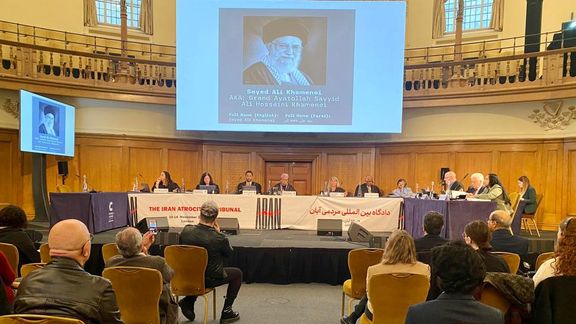
Mahboubeh Ramezanifard, mother of Pejman Gholipour, told the tribunal in a recorded message that she had kept her son’s “bloody clothes to show the world as evidence that my child was murdered.” Ramezanifard said her son’s jacket had “holes on both sides because he was shot with a live bullet."
In the afternoon session, United States-based opposition activist Masih Alinejad testified from her “own findings” that the Iranian authorities had made the families of those killed in the protests bury the corpses in remote places. Alinejad said this was “psychological torture.”
Alinejad also said “authorities” had threatened families not to talk to foreign media and has asked two for the cost of the bullet used to kill them. "The families believe there is no justice in Iran,” she said. “You can take your complaint against murderers to the murderers themselves.”
"We want this tribunal to hear the truth from witnesses," Shadi Sadr, a director of Justice for Iran, one of the tribunal organizers, told Iran International Wednesday.
Speaking via video to the tribunal, Nahid Shirbisheh said her son Pouya had been shot in the head while protesting peacefully alongside his mother in Karaj. She said hers was the first family to openly tell the world about “the atrocities of the Islamic Republic.”
"We didn't fear the consequences,” she said. “As a result, we have constantly been threatened and detained. Pouya's father is still in prison, in solitary confinement for seeking justice.”
The tribunal will in the next few days also hear the testimony of three Iranian police officers, a judicial official, and two doctors who tended to the wounded at their offices or homes to avoid arrest. These witnesses have travelled to London secretly.
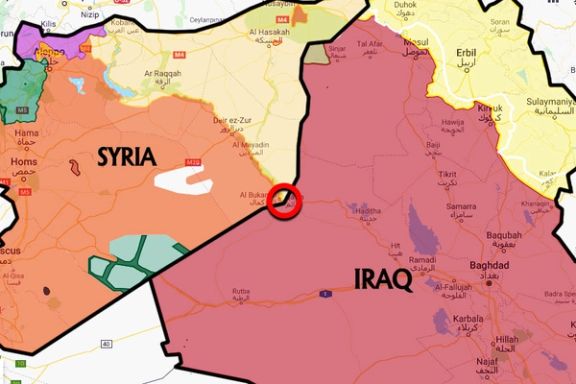
A Syrian war monitor reported an air attack Wednesday on Iran-affiliated forces in eastern Syria followed by large columns of militia trucks coming to the area.
The Syrian Observatory for Human Rights (SOHR) based in London quoted its sources in Syria that unknown aircraft, possibly drones, attacked warehouses in al-Bukamal belonging to Iran-commanded militia forces in the early hours of Wednesday. The report said that the attack might have come from Israel, or the International Coalition headed by the United States.
SOHR said the “attacks destroyed the arms and ammunition warehouses and caused huge explosions”, but no casualties have been reported.
The Syrian government, which usually is quick to announce suspected Israeli attacks on Iran-affiliated targets, has not issued a statement.
SOHR further says that convoys of trucks came to the area on November 7 and also hours after Wednesday’s attack. Al-Bukamal ciry is near Syria’s border with Iraq from where shipments and fighters sent by Iran cross the border from Iraq. The area is known as a major military staging point for Iran.
In recent weeks Israel has continued attacks on Iranian targets in Syria, without any acknowledgement.
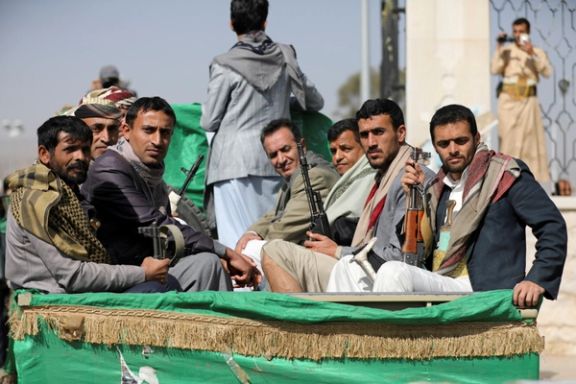
Assault rifles supplied by Iran to Yemen’s Houthis are finding their way across the Gulf of Aden to Somalia, a Geneva-based think tank reported Wednesday.
Iranian Fingerprint?, a report from Global Initiative Against Translational Organized Crime, was based on information from more than 400 weapons identified in 13 locations in Somalia over eight months and on weapons carried by dhows intercepted by naval vessels.
Report author Jay Bahadur, formerly coordinator of the United Nations Security Council monitoring group on Somalia and Eritrea, notes Iran’s consistent denial of supplying weapons to Ansar Allah, who since 2014 have battled a Saudi intervention, but writes that “a preponderance of evidence points to Iranian state supply.”
With many of the identified weapons – mainly Type 56-1 automatic rifles – having batched serial numbers, they are likely to originated with a single supplier, the report says. One dhow seized by the US navy had a digital positioning system that recorded visits to Iran − including an anchorage near the naval base at Jask port − and southern Yemen, where its home port was Mukalla, an arms hub.
The report concludes that weapons from “the Iran-Yemen arms trade are being trafficked onward into Somalia itself,” although buyers and sellers along the way were unclear. Demand in Somalia would come from many armed factions jostling for position ahead of Somalia’s presidential election due later this yearbut repeatedly postponed, with the mandates of all federal authorities expired. Somalia also has the militant Sunni groups al-Shabaab and the Islamic State group (Isis).
Neither Iran, Ansar Allah or Somalia have commented on the report, which claims to be the first research into the scale of illicit arms smuggling from Yemen into the Horn of Africa country.
Gateway For Illicit Weapons
The report cross-references serial numbers of Type 56-1 assault rifles, a Chinese made model similar to an AK47, either found in Somalia, seized in four naval operations, captured by anti-Houthi forces in Yemen, or in one instance held by an arms dealer in Sanaa. In particular, the report obtained an inventory of weapons seized by the USS Monterey in May 2021 in the Arabian Sea.
“The documented materiel included 38 Type 56-1 assault rifles…that had likely originated in Iranian arms shipments to the Houthis,” the report says. “The majority of Type 56-1 rifles documented in this study were found in Puntland, a semi-autonomous region in northern Somalia which has historically functioned as the gateway for illicit weapons into the country.” But the report “documented Type 56-1 rifles as far south in Somalia as Dolow, a town bordering Ethiopia…”
Iran is “only one party” sending arms to Yemen, the report says: “Arms and ammunition supplied to Yemeni actors by the Saudi Arabia, the UAE [United Arab Emirates], and even the United States have previously been diverted into illicit markets.”
The report notes that the spread of arms from the Yemen conflict has “potentially serious security implications” not just for Somalia, but for neighboring Ethiopia and Kenya, with Type 56-1 rifles “derived from the Iran–Yemen supply chain… documented in several towns bordering eastern Ethiopia and Kenya.” Ethiopia is locked in a civil war stemming from the crisis in Tigray.
While noting that the diversion of arms from the Yemen conflict has so far been confined to small arms, “the potential import of heavier weapons into Somalia – such as rocket-propelled grenades or anti-tank guided missiles…[could] enhance the capacity of al-Shabaab and ISIL [Isis] to challenge government forces, particularly in Puntland.”